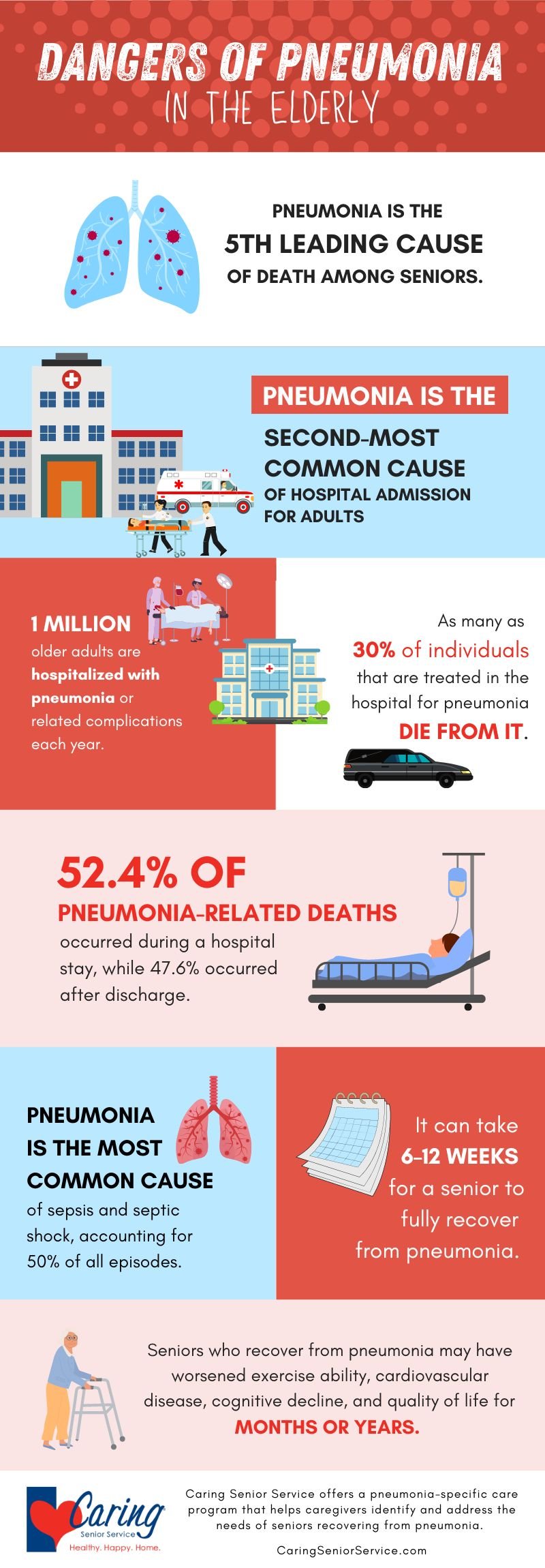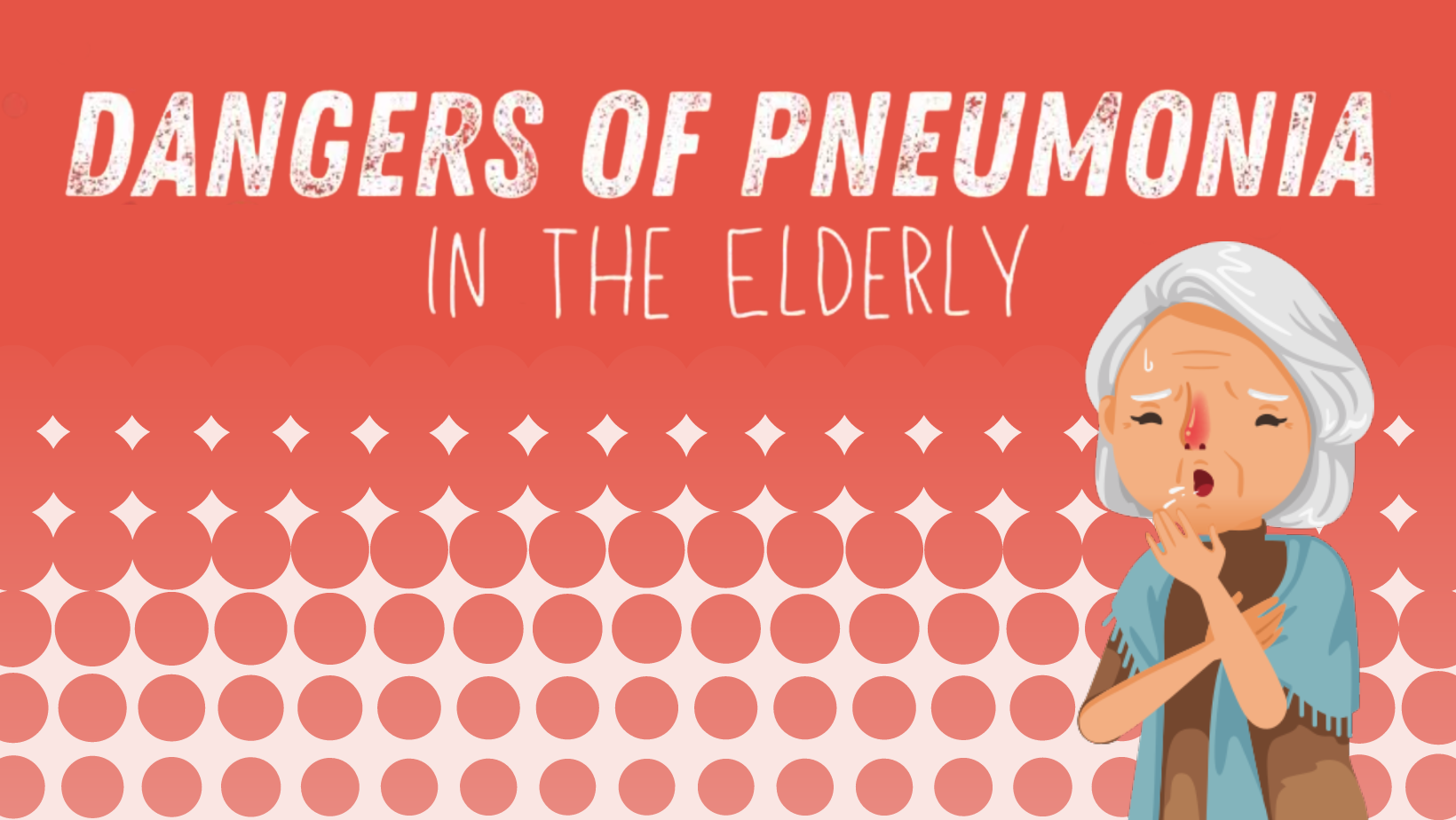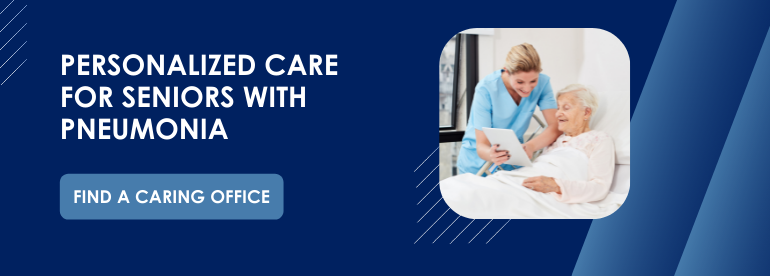Pneumonia in seniors happens quickly and has a poor prognosis. Seniors are susceptible to their pneumonia being severe. Discover the real danger pneumonia can pose for your elderly loved ones and learn how you can best care for seniors who get pneumonia.
View the text alternative of text alternative of The Dangers of Pneumonia In the Elderly.

Share this Image On Your Site
The Dangers of Pneumonia In the Elderly
Pneumonia is a frequent and serious illness in the elderly that is commonly cited as the fifth leading cause of death in seniors.
How serious is pneumonia in the elderly?
Elderly have higher risk of getting pneumonia and are more likely to die from it if they do. For US seniors, hospitalization for pneumonia has a greater risk of death compared to any of the other top 10 reasons for hospitalization.
Seniors are more likely to be hospitalized for pneumonia because they are more often at risk of having underlying pathologies such as diabetes, heart or respiratory failure of even kidney disease, considered to be factors of co-morbidity.
While successful pneumonia treatment often leads to full recovery. It can have longer term consequences. Adults who survive pneumonia may have worsened exercise ability cardiovascular disease, cognitive decline, and quality of life months or years.
Pneumonia in the elderly survival rates
Pneumonia is the most common cause of hospital admissions other than women giving birth. About 1 million adults in the US seek care in a hospital due to pneumonia every year, and 50,000 die from this disease.
There is a high rate of mortality with pneumonia in the elderly. As much as 30 percent of individuals that are treated in a hospital for pneumonia die from it.
Pneumonia presents a high mortality rate even after hospital discharge. In fact, for death in patients admitted to the hospital for pneumonia, 52.4% occurred during the hospital stay and 47.6% occurred after discharge.
Pneumonia in the elderly recovery time
When you are caring for a senior with pneumonia, you can expect a recovery time as long as six to eight weeks. This increased recovery time is due to the weakened state of the elderly with the illness and their body’s inability to fight off the bacteria that pneumonia produces in their lungs.
Like most illnesses, treating pneumonia in the elderly as soon as the first symptoms occur can increase the likelihood of recovery as well as reduce the downtime for disease.
Caring for seniors with pneumonia
If a loved one is diagnosed with pneumonia, there are some special considerations you should make to provide the best environment for recovery. Here are some tips on caring for a senior with pneumonia.
Carefully monitor symptoms
Pay close attention to your loved one and how their symptoms are progressing. Any worsening of symptoms should be a sign to seek medical attention immediately.
Give rides to doctor’s appointments
Seniors will likely have doctor’s appointments or need to pick up prescriptions. Family caregivers can help ease this burden by assisting with transportation.
Help with household chores
While your loved one is recovering from pneumonia, they may not be able to perform regular tasks, like cleaning. If possible, help with household chores so that your aging loved one can devote all of their energy to a speedy recovery instead of worrying about completing tasks at home.
Help with medication
Seniors may have trouble keeping track of their medications, so family caregivers can help administer prescribed or over-the-counter medicine to their loved ones. This can help ensure that seniors receive the proper dosage of medication on the correct schedule.
Manage meals
Many seniors with pneumonia will experience a loss of appetite. It’s important to make sure that they receive the proper nutrients and hydration to recover.
Control proper oral hygiene
Good oral hygiene can reduce bad bacteria that cause the lung infection. Keeping teeth and gums healthy may decrease the risk of pneumonia by reducing the bacteria in the mouth.
Hire a professional caregiver
You may also want to consider hiring a professional caregiver to tend to your loved one while they recover. An in-home caregiver from Caring Senior Service can help with many of the tasks already mentioned, which can provide peace of mind if you aren’t able to care for your loved one personally.


